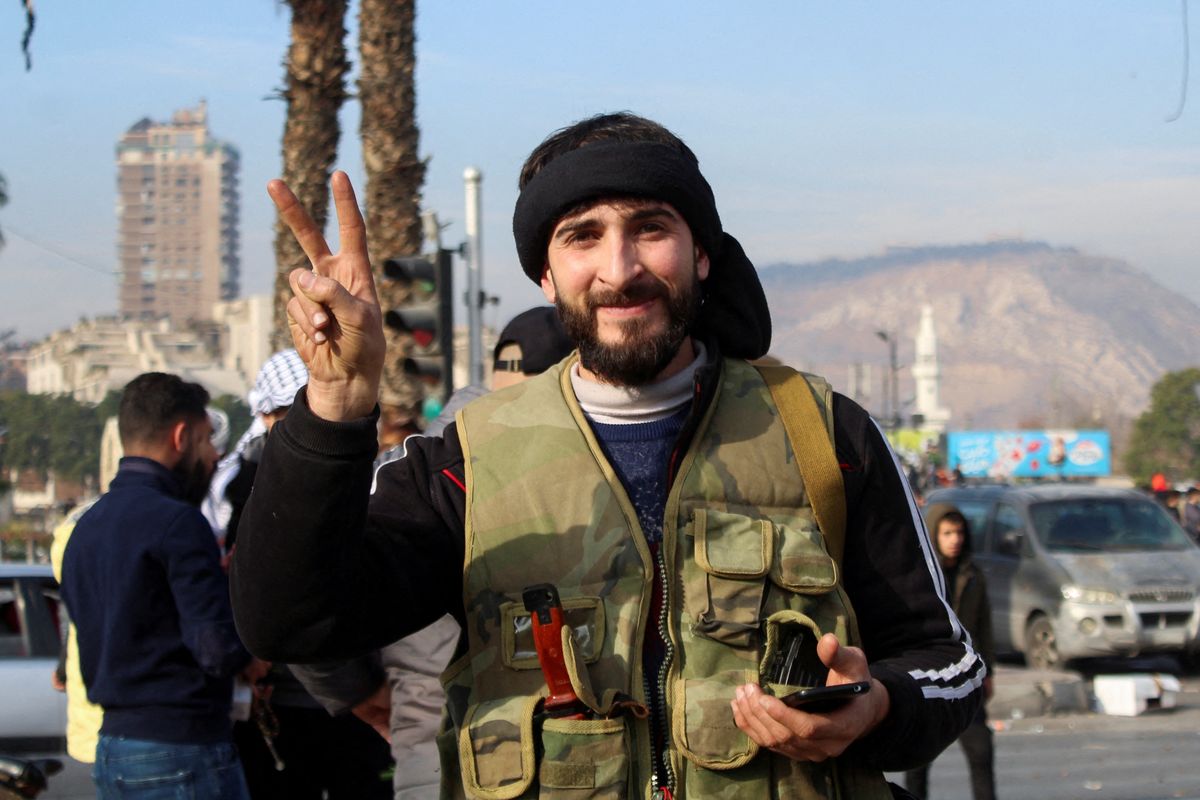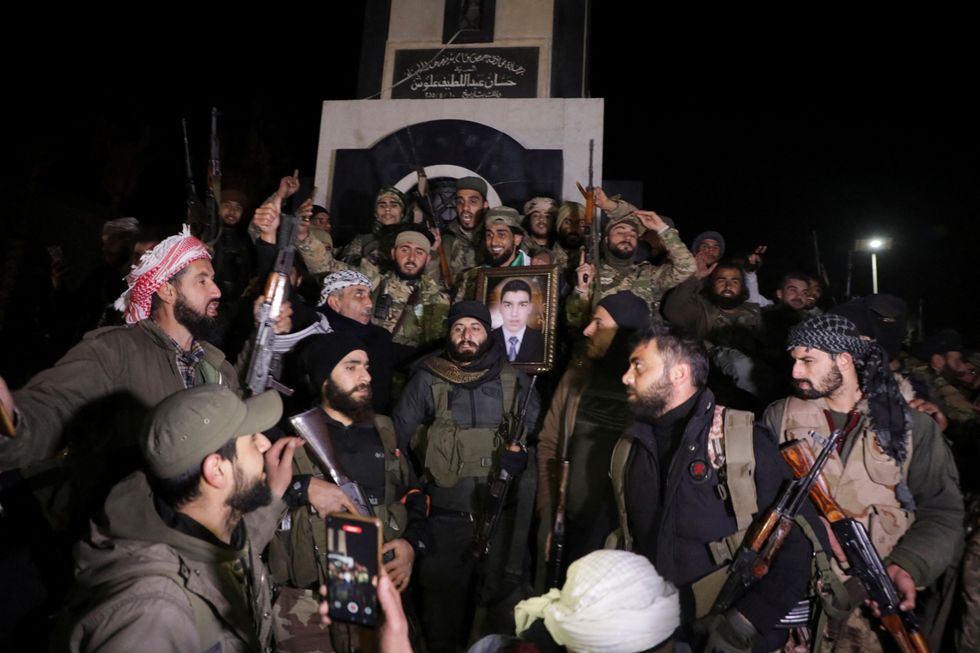Syrian rebels topple Assad, transforming nation and Middle East
President Bashar al-Assad's overthrow after 13 years brought an unexpected end to a war that had been in deep freeze for years, with hundreds of thousands dead, cities pounded to dust, and an economy hollowed out by global sanctions.
Reuters
News Agency Partner
Reuters is a leading source of news and information, delivering fact-based reporting and expert analysis on international events and trends.

A rebel fighter gestures as people celebrate after Syrian rebels announced that they have ousted President Bashar al-Assad, in Damascus, Syria December 8, 2024.
Reuters
Lightning rebel advance ends Assad family rule
Rebels say they entered capital with no sign of army
Assad's fall deals major blow to allies Russia and Iran
Syria rebel fighters raced into Damascus unopposed on Sunday, overthrowing President Bashar al-Assad and ending nearly six decades of his family's iron-fisted rule after a lightning advance that reversed the course of a 13-year civil war.
In one of the most consequential turning points in the Middle East for generations, the fall of Assad's government wiped out a bastion from which Iran and Russia exercised influence across the Arab world. Moscow gave him and his family asylum.
His sudden overthrow, at the hands of a Turkish-backed revolt with roots in jihadist Sunni Islam, limits Iran's ability to spread weapons to its allies and could cost Russia its Mediterranean naval base. It also may pave the way for millions of refugees scattered for more than a decade in camps across Turkey, Lebanon and Jordan to finally return home.
For Syrians, it brought a sudden unexpected end to a war that had been in deep freeze for years, with hundreds of thousands dead, cities pounded to dust, an economy hollowed out by global sanctions and seemingly no resolution in sight.
"How many people were displaced across the world? How many people lived in tents? How many drowned in the seas?" the top rebel commander Abu Mohammed al-Golani told a huge crowd at the medieval Umayyad Mosque in central Damascus, referring to refugees who drowned trying to reach Europe.
"A new history, my brothers, is being written in the entire region after this great victory," he said. It would take hard work to build a new Syria which he said would be "a beacon for the Islamic nation".

Eyes ripped out
As the sun set in Damascus without Assad for the first time, the roads leading into the city were mostly empty, apart from motorcycles carrying armed men and rebel vehicles caked with brownish mud as camouflage.
Some men could be seen looting a shopping centre on the road between the capital and the Lebanese border, stuffing goods into plastic bags or into pick-up trucks. The myriad checkpoints lining the road to Damascus were empty. Posters of Assad had been torn at his eyes. A burning Syrian military truck was parked diagonally on the road out of the city.
A thick column of black smoke billowed out from the Mazzeh neighbourhood, where Israeli strikes earlier had targeted Syrian state security branches, according to two security sources.
Throughout the evening, intermittent gunfire rang out throughout the city in apparent celebration.
Shops and restaurants closed early in line with a curfew imposed by the rebels. Just before it came into effect, people could be seen briskly walking home with stacks of bread.
Earlier, the rebels said they had entered the capital with no sign of army deployments. Thousands of people in cars and on foot congregated at a main square in Damascus waving and chanting "Freedom".
People were seen walking inside the Al-Rawda Presidential Palace, with some leaving carrying furniture from inside. A motorcycle was parked on the intricately-laid parquet floor of a gilded hall.
- YouTubewww.youtube.com
Daunting task ahead
When the celebrations fade, Syria's new leaders will face the daunting task of trying to deliver stability to a diverse country that will need billions of dollars in aid to rebuild.
During the civil war, which erupted in 2011 as an uprising against Assad, his forces and their Russian allies bombed cities to rubble. The refugee crisis across the Middle East was one of the biggest of modern times and caused a political reckoning in Europe when a million people arrived in 2015.
In recent years Turkey had backed the rebels in a small redoubt in the northwest and along its border. The United States, which still has 900 soldiers on the ground, backed a Kurdish-led alliance that fought Islamic State jihadists from 2014-2017.
President Joe Biden's administration was monitoring developments but has not adjusted the positioning of the U.S. troops, officials told Reuters.
The biggest strategic losers were Russia and Iran, which had intervened in the war's early years to rescue Assad, helping him recapture most territory and all major cities. The front lines were frozen four years ago under a deal Russia and Iran reached with Turkey.
But Moscow's focus on its war in Ukraine and the blows to Iran's allies following the war in Gaza - particularly the decimation of Hezbollah by Israel over the past two months - left Assad with scant support at the end.
Even after Assad had fled, Israel continued to strike targets associated with his government and its Iranian-backed allies, including one in Damascus where Israel had previously accused Iran of developing missiles. Netanyahu said the toppling of Assad could make it easier for Israel to reach a ceasefire deal to free hostages in Gaza.
On Sunday rebels stormed Iran's embassy, Iran's English-language Press TV reported. Iran's foreign ministry said Syria's fate was the sole responsibility of the Syrian people.
Hezbollah had pulled all its remaining forces from Syria on Saturday, two Lebanese security sources said.

U.S. to maintain presence
Syria's civil war, which erupted in 2011 as an uprising against Assad's rule, dragged in a string of outside powers, created space for jihadist militants to plot attacks around the world and sent millions of refugees into neighboring states.
The frontlines were dormant for years. Then fighters who had once been affiliated with Al Qaeda suddenly burst into action in late November.

The pace of events stunned Arab capitals and raised concerns about a new wave of instability in a region already in turmoil following the eruption after the Hamas-led attack on Israel on Oct. 7, 2023, and the ensuing Gaza war.
It marks a turning point for Syria, shattered by years of war which has turned cities to rubble and killed hundreds of thousands of people.
Western governments, which have shunned the Assad-led state for years, must decide how to deal with a new administration in which a globally designated terrorist group - Golani's Hayat Tahrir al-Sham (HTS) - looks set to have influence.
The United States will continue to maintain its presence in eastern Syria and will take measures necessary to prevent a resurgence of the Islamic State, Deputy Assistant Secretary of Defense for the Middle East Daniel Shapiro said at a conference in Manama on Sunday.
Turkish Foreign Minister Hakan Fidan said "terrorist organizations" must not be allowed to take advantage of the situation in Syria and called for caution.
HTS, which spearheaded the rebel advances across western Syria, was formerly an al Qaeda affiliate until its leader Golani severed ties with the global jihadist movement in 2016.

"The real question is how orderly will this transition be, and it seems quite clear that Golani is very eager for it to be an orderly one," said Joshua Landis, a Syria expert and Director of the Center for Middle East Studies at the University of Oklahoma.
"They are going to have to rebuild ... they will need Europe and the U.S. to lift sanctions," Landis added.
HTS is Syria's strongest rebel group and some Syrians remain fearful it will impose draconian rule or instigate reprisals.
Countries like the United Arab Emirates and Egypt, both close U.S. allies, see Islamist militant groups as an existential threat, so HTS may face resistance from the regional heavyweights.
In the Manama conference, Anwar Gargash, the diplomatic advisor to the United Arab Emirates president, said a main concern for that country is "extremism and terrorism."
Israel, which is likely to celebrate the fall of its enemy Assad after it severely weakened its other main foes Hezbollah and Hamas in over a year of fighting, said it had deployed forces in the U.N.-monitored buffer zone with Syria and at a number of points necessary for defense.
Suspected Israeli strikes hit Mazzeh district of Damascus, one Lebanese and one Syrian security source said on Sunday.
Jets believed to be Israeli bombed the Khalkhala air base in southern Syria that was evacuated by the Syrian army overnight, two regional security sources told Reuters.
The Israeli government had no immediate comment on the reported strikes, which one of the sources said appeared to be aimed at preventing weapons falling into the hands of radical religious groups.







Comments
See what people are discussing